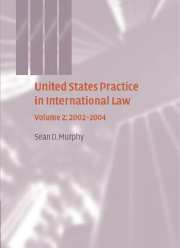Book contents
- Frontmatter
- Contents
- Foreword by Judge Stephen M. Schwebel
- Acknowledgments
- Table of Periodical Abbreviations
- Table of Cases
- Table of U.S. Statutes
- Table of Treaties
- I General International and U.S. Foreign Relations Law
- II State Diplomatic and Consular Relations
- III State Jurisdiction and Immunities
- IV State Responsibility and Liability
- V International Organizations
- VI International Oceans, Environment, Health, and Aviation Law
- VII International Economic Law
- VIII International Human Rights
- IX International Criminal Law
- X Use of Force and Arms Control
- XI Settlement of Disputes
- XII Private International Law
- Annex
- Index
IX - International Criminal Law
Published online by Cambridge University Press: 10 December 2009
- Frontmatter
- Contents
- Foreword by Judge Stephen M. Schwebel
- Acknowledgments
- Table of Periodical Abbreviations
- Table of Cases
- Table of U.S. Statutes
- Table of Treaties
- I General International and U.S. Foreign Relations Law
- II State Diplomatic and Consular Relations
- III State Jurisdiction and Immunities
- IV State Responsibility and Liability
- V International Organizations
- VI International Oceans, Environment, Health, and Aviation Law
- VII International Economic Law
- VIII International Human Rights
- IX International Criminal Law
- X Use of Force and Arms Control
- XI Settlement of Disputes
- XII Private International Law
- Annex
- Index
Summary
OVERVIEW
International criminal law was at the forefront of United States conduct during 2002–2004. The traditional areas of treaty development on extradition and mutual legal assistance continued to feature, although this period saw a greater movement away from bilateral instruments to the development of such treaties on a global or regional level. Moreover, treaty practice in this field saw efforts to address emergent problem-areas, such as cybercrime. Non-treaty instruments were important in some instances, such as the non-binding trade controls on “conflict diamonds” organized through the Kimberley Process. The United States adopted new statutes to reinforce such instruments or to promote general norms of international law, such as through a 2003 criminal statute that protects children from transnational exploitation. At the same time, the United States reacted adversely to some efforts by other states to extend their jurisdiction, such as occurred with respect to Belgium's universal jurisdiction statute, or through the creation of the new International Criminal Court (ICC). While the United States continued to support the ad hoc international criminal tribunals for the former Yugoslavia and for Rwanda, it aggressively pursued exemptions for U.S. persons from the ICC through the negotiation of nearly 100 bilateral agreements and through Security Council resolutions designed to shield from the ICC U.S. personnel engaged in UN peacekeeping operations.
Perhaps the most publicly debated aspect of U.S. practice in this time period was the treatment under the laws of war of persons detained as a part of the conflicts in Afghanistan and Iraq.
- Type
- Chapter
- Information
- United States Practice in International Law , pp. 235 - 319Publisher: Cambridge University PressPrint publication year: 2006



